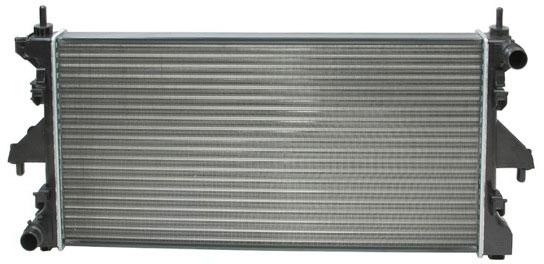EIS Radiator
185155
Ways to apply
- Build your basket and select Trade Credit at checkout.
- Apply below to check your eligibility.
Activate your limit
- If eligible, receive your Trade Credit limit instantly.
- Authenticate your business with an ID check*.
*Only required on your first Trade Credit purchase.
Pay on account
- Complete your purchase and pay on account at the end of the following month.
- Enjoy no interest or transaction fees**.
**Late payments can impact your business credit
Already applied and have a limit? Approve your order via SMS to finalise your purchase.

EIS Radiator
185155
EIS Radiator
A radiator is a type of heat exchanger. It is designed to transfer heat from the hot coolant that flows through it to the air blown through it by the fan.Most modern cars use aluminum radiators. These radiators are made by brazing thin aluminum fins to flattened aluminum tubes. The coolant flows from the inlet to the outlet through many tubes mounted in a parallel arrangement. The fins conduct the heat from the tubes and transfer it to the air flowing through the radiator.The tubes sometimes have a type of fin inserted into them called a turbulator, which increases the turbulence of the fluid flowing through the tubes. If the fluid flowed very smoothly through the tubes, only the fluid actually touching the tubes would be cooled directly. The amount of heat transferred to the tubes from the fluid running through them depends on the difference in temperature between the tube and the fluid touching it. So if the fluid that is in contact with the tube cools down quickly, less heat will be transferred. By creating turbulence inside the tube, all of the fluid mixes together, keeping the temperature of the fluid touching the tubes up so that more heat can be extracted, and all of the fluid inside the tube is used effectively.Some Radiators have a tank on each side, and inside the tank, a transmission cooler. The transmission cooler is like a radiator within a radiator, except instead of exchanging heat with the air, the oil exchanges heat with the coolant in the radiator.If you need to return an item we'll happily offer a refund as long as this is within 28 days of delivery, in its original packaging and you have proof of purchase.
There are several easy ways to return your item(s):
- FREE in-store returns*
- by post
You can return an item for FREE to a Retail store, but if you choose to return by post you'll need to cover the cost of postage. However, if the item you're returning is faulty we'll refund the postage once we've received the item and checked the fault.
For more information on our Returns Information, including our Courier service, please visit: Returns Information | Halfords UK
Print a returns note form here.
* Please don’t forget your proof of purchase. We may need to verify the serial number on your receipt against the serial number on the item being returned.
EIS Radiator
A radiator is a type of heat exchanger. It is designed to transfer heat from the hot coolant that flows through it to the air blown through it by the fan.Most modern cars use aluminum radiators. These radiators are made by brazing thin aluminum fins to flattened aluminum tubes. The coolant flows from the inlet to the outlet through many tubes mounted in a parallel arrangement. The fins conduct the heat from the tubes and transfer it to the air flowing through the radiator.The tubes sometimes have a type of fin inserted into them called a turbulator, which increases the turbulence of the fluid flowing through the tubes. If the fluid flowed very smoothly through the tubes, only the fluid actually touching the tubes would be cooled directly. The amount of heat transferred to the tubes from the fluid running through them depends on the difference in temperature between the tube and the fluid touching it. So if the fluid that is in contact with the tube cools down quickly, less heat will be transferred. By creating turbulence inside the tube, all of the fluid mixes together, keeping the temperature of the fluid touching the tubes up so that more heat can be extracted, and all of the fluid inside the tube is used effectively.Some Radiators have a tank on each side, and inside the tank, a transmission cooler. The transmission cooler is like a radiator within a radiator, except instead of exchanging heat with the air, the oil exchanges heat with the coolant in the radiator.If you need to return an item we'll happily offer a refund as long as this is within 28 days of delivery, in its original packaging and you have proof of purchase.
There are several easy ways to return your item(s):
- FREE in-store returns*
- by post
You can return an item for FREE to a Retail store, but if you choose to return by post you'll need to cover the cost of postage. However, if the item you're returning is faulty we'll refund the postage once we've received the item and checked the fault.
For more information on our Returns Information, including our Courier service, please visit: Returns Information | Halfords UK
Print a returns note form here.
* Please don’t forget your proof of purchase. We may need to verify the serial number on your receipt against the serial number on the item being returned.

